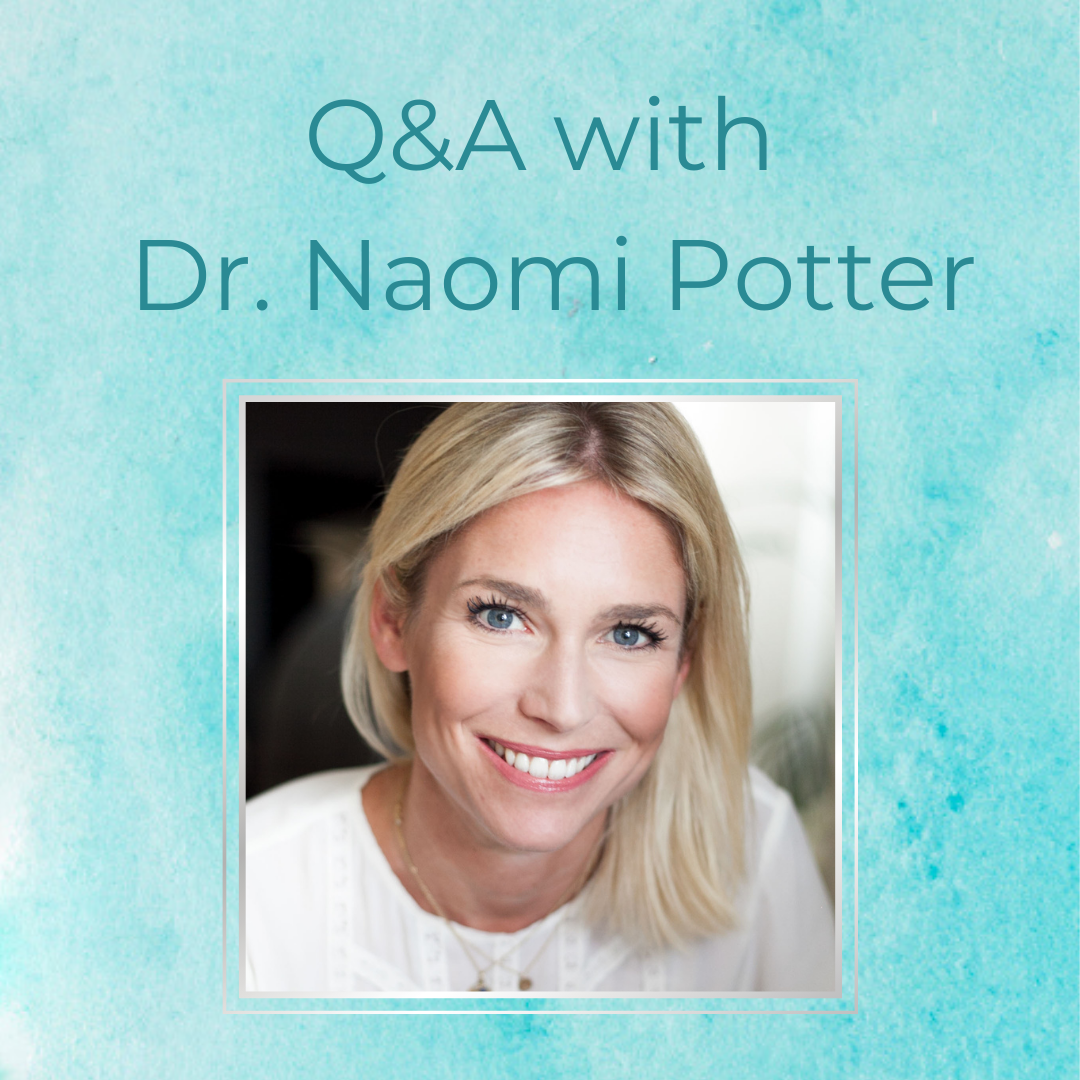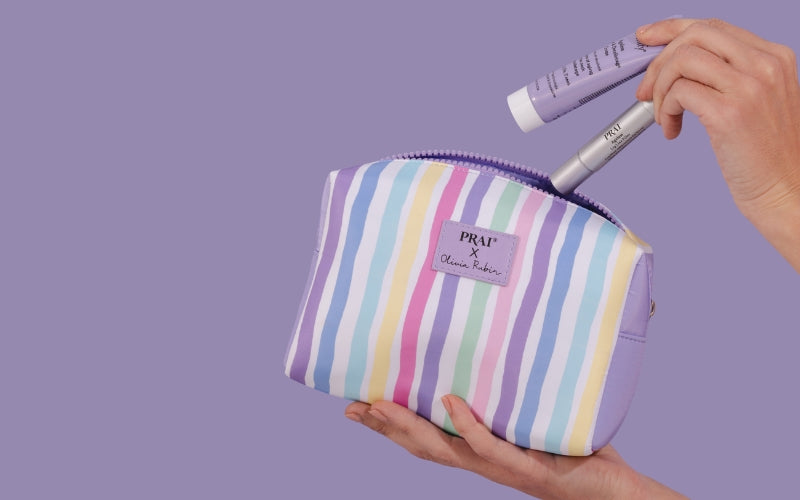Menopause Q&A with Dr. Naomi Potter

As experts in targeted skincare, PRAI has partnered with M&S to bring you MenoGlow, a unique range designed to address the concerns of menopausal skin. At PRAI, we not only want to equip you with the right skincare products to tackle your skin changes, but the information you need to truly understand the menopause and its affect on our bodies, skin and aging process. That's why we turned to GP and menopause specialist, Dr. Naomi Potter for the facts.
PRAI Beauty’s Commercial Director, Katy Eccles sat down with Dr. Naomi for an intimate conversation about the menopause to answer your most sought after questions on the hot topic!
Let’s start by asking, what exactly is the menopause?
Essentially, it is a state of oestrogen deficiency. As you head into the perimenopause and menopause your ovaries which have been producing oestrogen since you were a teenager, fail and stop producing oestrogen reliably and consistently. You can end up having a very turbulent time during the perimenopause where it comes in fits and starts.
By the time you are properly post-menopausal, your ovaries really aren’t doing much at all. If you scan them, they are very tiny rather than being big juicy and healthy, so you really don’t have much oestrogen, if any at all circulating. That’s the point you’re considered post-menopausal.
So why would a hot flush happen? Is that like you’ve said that moment of a change of oestrogen?
No, that’s not a sudden plummet of oestrogen... it’s thought that it’s probably a kind of two-pronged thing to do with your thermo-regulation sensor in your brain going a bit array when your oestrogen is all over the place or absent. The same with your blood vessels, your blood vessels are sensitive to oestrogen or lack of oestrogen and that’s what causes a kind of vasodilation, so your blood vessels suddenly dilate, and that gives you that hot flush.
It’s also not the most common symptom, it’s really well recognised but not everybody has them. It’s the women that don’t have the hot flushes (and the night sweats) that go under the radar thinking there may be all sorts of other things wrong because they aren’t presented with this typical symptom.
So, what age would be the typical starting age assuming there are no underlining issues?
So, the average age of periods stopping is from fifty-one. But in terms of symptoms beginning, I think it’s probably forties as the average. Things do start creeping in, whether that’s anxiety, sleep issues, skin changes, any of those symptoms I would say mid-forties. I think it would be unusual for a woman in her late forties to have not noticed something.
Does this mean if you start seeing symptoms in your early forties, you’re through it by your fifties, or does it not work like that?
No not really, you don’t go through menopause you go into it. You don’t come out the other side, you go into a state of oestrogen deficiency. Your symptoms, if you have them, can settle but you will permanently be oestrogen deficient unless you take oestrogen replacement.
Ok interesting, what are the common discussed Menopause symptoms that a woman can see?
I think one of the most common presenting symptoms is women saying ‘I’ve aged overnight’, and maybe it’s not quite overnight but it can be over the course of a few weeks or months which they find really distressing. It’s an outward sign, so the things that are happening on the inside you can reveal them if you want to, whereas your skin will say it to the outside world.
There’s the general ageing, the texture of the skin can change and become much dryer and more lined, fine lines, itching can be a particular problem even if your skin isn’t dry! So, itching is associated with dryness, but you can have a terrible itch even without dry skin.
It’s also general dryness, so dry eyes, dry nose, itchy ears, dry mouth, it’s a general dryness.
And what effects do these have on the body?
The collagen structure changes, and you can get less collagen and structures change shape, and the skin will sag. Then your bone structure that holds the skin in place, also changes because bones change without so much oestrogen. So literally, your whole face can change.
You lose fat, your fat is distributed differently. So, when you’re pre-menopausal your fat is distributed peripherally so under the limbs and face. Post – menopausal, you lose it from your face and arms and legs, and it gets redistributed centrally.
Ok, very interesting. When should we recommend that our customers see their GP if they are starting to show symptoms?
If you have difficulties with your skin, if you have spots or problematic acne and what looks like rosacea with the redness and flushed cheeks... those would be reasons to go to the GP because they can be treated in themselves. Itch is also important because that can be a sign of other things and may need investigating further.
If you’re of a typical age and have no other symptoms it may be the beginnings of the peri menopause, but it may not be - if in doubt definitely send someone to their GP for caution. Having a few skin changes may not prompt them to come to me but may prompt them to go to PRAI!
There is a lot of talk about “loss of Collagen”. What is collagen, how do we lose it!?
Collagen is a protein and it’s a framework or scaffolding that holds everything in place.
So, if you think about the way your facial structure is made if it was just skin and a layer of fat and muscle, it would all just hang down, so what collagen does is it gives a scaffolding effect. When collagen degrades, it doesn’t really get replaced and it’s very hard for it to get remodelled or rebuilt and that’s why things kind of go south.
But, if you keep things hydrated, both your collagen structure and your skin structure then helps keep things plumper and looking less saggy. If you have a skin that is hydrated, it is less likely to be irritated and you’re therefore less likely do things such as scratching it and damage it and end up in an itch / scratch cycle that can damage the skin permanently.
What’s your opinion on taking Collagen as a supplement?
My feeling about taking collagen supplements is that, when we digest collagen or protein our digestion breaks it down into amino acids so into component parts. You then absorb it and it’s used for rebuilding but there is no magical way that your body can know that you’ve adjusted collagen meant for skin and reassembled it in exactly the same place that you want it reassembled. It’s just not science. It doesn’t’ make any sense.
Can we talk about HRT, what is HRT?
So, HRT is essentially oestrogen replacement and when you replace oestrogen, you can’t reverse ageing, but you can slow down the kind of ‘fall of a cliff’ that women can have when they suddenly lose oestrogen. Women stay younger for longer until the menopause in comparison to men but when they hit the menopause, they age faster than men.
So, you aren’t delaying your menopause using HRT?
Well, if you decide you want to stop, then your body will go into an oestrogen deficient state, but what you can do is go into the menopause in a much more controlled fashion. So, you can decrease it step wise, rather than a more turbulent fashion and suddenly stopping. This concept of you disguising the menopause is your interpretation of the menopause, we will all be oestrogen deficient by the time we are sixty unless you’re taking oestrogen.
Can you still suffer symptoms of menopause when on HRT?
If you’re adequately replaced with HRT you shouldn’t be oestrogen deficient and less likely to have symptoms. Some women do because they haven’t got the perfect care and go to a one size fits all GP, but with modern HRT you can make sure that you are adequately oestrogen replaced, and so your skin should have enough.
There are other things that can control those symptoms such as pores and spots, in terms of oestrogen deficiency, that should be sorted but there are definitely issues to do with sorting out everything to make sure it’s all in perfect balance for that individual.
Would you say HRT is safe?
There were a couple of studies that came out in late 2000’s that made it seem a bad or risky thing to do. It’s taken until now for new data to come out and the modern data shows it’s much safer.
What has testosterone got to do with menopause, is it the drop again?
Yes, so the ovaries use testosterone and it’s one of the main places of production. In the menopause testosterone levels drops off for the majority of women, some women notice the change and others don’t. So, if you have somebody who is established on HRT and they still have symptoms that is the point when you might need to start adding in testosterone.
It’s not universally prescribed and in-fact prescribed enough, but it is definitely a hormone that is in deficiency with a lot of perimenopausal women.
If someone has suffered the main signs of menopause (Hot flushes, night sweats, anxiety) does our body re- adjust to those symptoms, or can those symptoms return?
It sometimes does and sometimes doesn’t, again with menopause there are no fixed answers, there is really no way of knowing. The best gage is family members, if you’re lucky enough to have lots of sisters then you can look at them for a rough gage to what might happen for you. There are no fixed answers, there is no way of knowing. You’re definitely in the minority if they do return although sometimes, they do.
If you are symptom free, you just need to manage your health by exercising, making sure your diet is good.
Finally, what supplements would you recommend to take during menopause?
Vitamin D is important for bones and bone density. Multivitamins and if you eat a really balanced diet, you’re unlikely to be deficient in most things
Katy: Thank you Naomi that was absolutely brilliant, this has cemented the understanding of why PRAI created a skincare collection that would be perfect for menopausal skin, and the benefits that the customers are going to get from our range.
Have a question about how menopause affects your skin or need help finding the right skincare products to address your concerns? Reach out at customercare@praibeauty.com and one of our Neck-Xperts will be happy to help!


